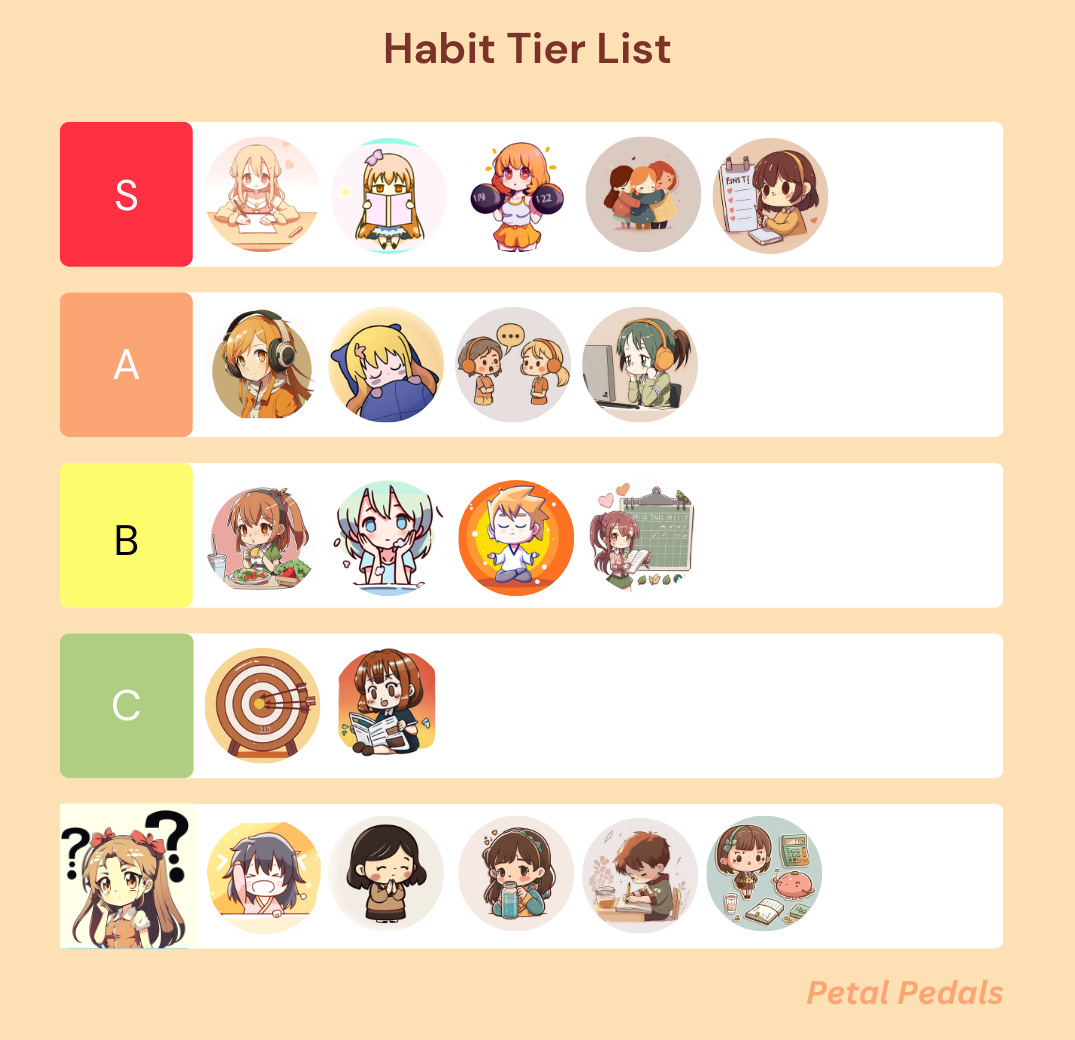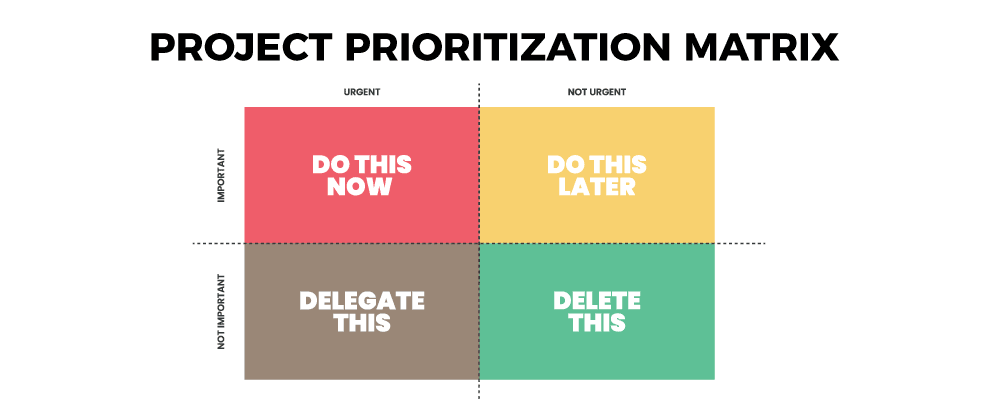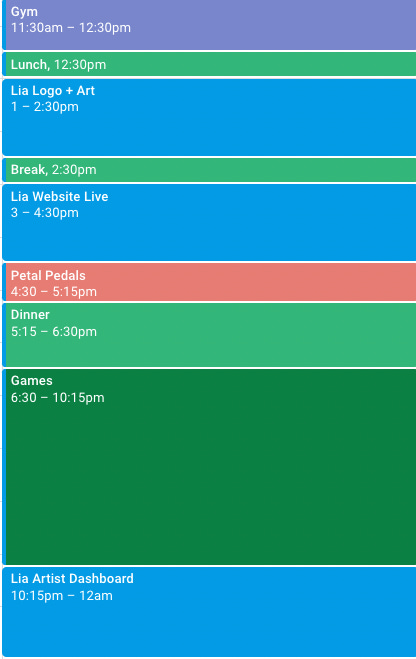The Ultimate Habit Tier List for Living a More Productive and Meaningful Life
20 Different habits to level up your professional and personal life
Petal #7 - Mar 4, 2023
“Habits are the compound interest of self-improvement.” - James Clear
We all know how powerful doing things on autopilot can be. Put together with the effects of compound interest, developing the right tiny habits can lead to tremendous, outsized returns. As Clear writes, if we get better 1% each day you’ll end up thirty-seven times better by the end of the year.
So I went ahead and ranked 20 habits that I am currently practicing, into 5 different tiers. If you’re serious about leveling up your game in life, read on to see what you might be missing.
Quick disclaimer: although I’m the type of nerd to do research and look for evidence-based solutions, at the end of the day, this is just my opinion on what worked for me. Figure out what kind of person you are, and what drives you to success.
S Tier
S: Writing, Reading, Exercise, Social Interactions, Prioritization
Writing
If I had to pick one single habit to recommend to start living a fuller life, it would be to start writing.
“Write what?” you may ask.
The answer is anything. But make it a routine, and make it regular. Bonus points if you put it out in the open for others to read, like this newsletter. Writing not only helps you retain material better, but it also makes sure you understand that content better too.
If you can’t put your thoughts into writing, it may be a sign that you don’t actually understand the topic in the first place.
So whether it’s your personal Notion encyclopedia, journaling, general-note taking, game strategy breakdowns on forums, or weekly newsletters to your friends, you’ll see a major shift in how you approach different aspects of life once you become a creator vs. a consumer.
Reading
It’s no mystery that reading regularly leads to outsized long-term results.
Bill Gates is famously known to read 50 books a year. Warren Buffet reads 500 pages a day. Elon Musk is a voracious reader and learned literal rocket science from books. Perhaps what we’re after is to become an endless learner, but one of the most time-tested methods of learning is reading.
My daily goal is to “read 5 pages every night before bedtime” and I’m sure that’s probably the most unambitious goal in the world.
I tried other goals, like “one chapter a day” or “20 minutes every night”, but after a tiring day at work, I often found those numbers incredibly intimidating. I would give up after a few days. But “5 pages” was a joke. There was literally no excuse for me to not read five pages. And 99% of the time, those 5 pages ended up being 10, 30, or 50. Getting started was the hard part.
So toss a kindle onto your pillow after you make your bed in the morning, and set a goal to read just a few pages each night. If you don’t know where to start, The Third Door by Alex Banayan is an incredible book. Highly recommend it.
Exercising
We all know the benefits of exercising. Longer life, fewer diseases, better looks, and what not.
But what’s often overlooked are the tremendous number of benefits that exercise has on your mental performance - i.e. the things that we do at work. Research is crystal clear on the effects of exercise on improved focus, mental clarity, reduced stress, and reduced anxiety. It’s not just a simple “get your heart rate up”, but there are literal chemicals produced by your body that will boost your mental performance.
Plus, who doesn’t want to look good and live longer?
Regular Social Interactions
Setting aside quality time to spend with loved ones is one of my highest-value habits.
Because of my personality, connecting with friends and family regularly is not only enjoyable, but it really energizes me with a fresh breath of inspiration and motivation. It reminds me of why I’m working so hard to start my own business in the first place.
But even if you don’t enjoy social interactions in the same way, the research is also painstakingly clear on how important having strong social connections is on all aspects of your life: longevity, lower rates of depression, improved productivity, and so much more.
If we learned anything from the longest-running social experiment in human history, it’s that the single biggest predictor of someone’s happiness is the quality of their relationships.
Whether it’s for fun, for inspiration, or just for the science of being optimal, make a habit to connect with your social group regularly.
Prioritization
“Most of us spend too much time on what is urgent and not enough time on what is important.” - Stephen Covey, best selling author
When I was working in big tech, the phrase “prioritize impact” was shoved down my throat more than I could count. But maybe that was for the better. Although it sounds cliche, and it’s something we all know we should do, if you sit back and take an objective view at your life, it’s often something we don’t do in practice.
It is just so easy to focus on what’s urgent instead of what is truly important. If you have some kind of direction and motivation in life, you likely have many different things on your plate at once.
You have to take that course on design and marketing. The report for next quarter is creeping up quickly. Did you get your engine oil changed this year? How about that email that your boss sent you regarding the cookies? Or finally getting around to watching Demon Slayer season 2?
We all have 24 hours in life. And what leads to outsized impact is making sure to allocate your time - your only non-renewable resource in life - to important things.
A Tier
A: Listening to Podcasts and Audiobooks, Regular Sleep Schedule, Active Listening, Limiting Social Media Time
Listening to Podcasts and Audiobooks
If you’re not listening to Podcasts (or Audiobooks) regularly, you’re missing out. Really.
This habit might have been the single most important factor that made me leave my full-time job.
Here’s how it works.
Chances are, you have a lot of downtime in life. Whether it’s on your commute to work in a car, or a nice long walk to the gym, there are many situations in life where you’re listening to something but don’t have the freedom to actually read or watch something. Making audio learning a default habit in these situations will pay huge dividends in your life.
If your one-way commute is thirty minutes, a round trip would mean you get an extra one hour a day that you can put towards self-improvement and learning. That’s a whole entire book per month. Audible is a fantastic place to start for books, and Deep Dive with Ali Abdaal is an excellent podcast for any entrepreneur or self-improvement junkie. I highly recommend the episode with Daniel Priestley.
Having a Regular Sleep Schedule
Sleep and productivity have such a weird relationship with each other.
At the one hand you have those TED videos on Youtube talking about how not getting 8.375 hours of sleep a night will give you cancer. And then on the other you have former CEO of Bing and President of Microsoft Qi Lu who is known for living off of four hours of sleep for more than a decade.
That’s why I’m hesitant to put a number on the hours of sleep you need. And besides, modern research continues to suggest that the optimal hours of sleep heavily depends on the individual. For some it may be 10, and for others it may be as low as 6.
But what we do know is that there are a ton of benefits for having a regular sleep schedule. Going to bed and waking up at the same time have tons of correlations with better sleep quality, increased energy, and productivity. And if you’re the type to build out your life system as an architect, having this guiding skeleton of bed time and rise time will make your entire process much more effective.
Active Listening
"Better to remain silent and be thought a fool than to speak out and remove all doubt." - Abraham Lincoln
Listening is hard. Listening is really hard.
But time and time again as I read more books on business and entrepreneurship, it becomes unmistakably clear what kind of benefits intentional, active listening has on both our professional and personal lives.
This is one of the habits on this list that I still continue to struggle with. It’s not something you can set an alarm for at 7AM each morning to start practicing.
But if you start this habit of intentional listening, you’ll see small but significant changes in your life. And these changes add up. When someone is telling you a story about a struggle, instead of jumping straight in with a proposed solution or responding with “Oh I know exactly how you feel. I was like that when-”, see what happens when you just look them in the eyes, nod, and listen.
People love great listeners. And great listeners are hard to come by.
Limiting Social Media
I’m not going to say much about this one, because we all know it.
Limit distractions like social media, and limit them intentionally. I wrote about this in a previous newsletter if you want to learn more.
And that’s all for the A tier!
B Tier
B: Eating Healthy, Self-care, Meditation, Calendaring
Eating Healthy
Healthy eating is a necessary habit for life.
We all know the science and chemistry behind the importance of eating healthy and how it relates to our performance and overall health.
The only reason I put it down in B-Tier though, is that for the young, aspiring entrepreneur or professional who’s pouring her life into a craft, there are other habits that will pay more immediate near-term benefits over the course of the next few years.
I’m not saying that it’s okay to eat McDonalds for 14 meals a week, obviously, but you don’t need a perfect macro-friendly and antioxidant-optimized diet to be a top-performer.
Self Care and Hygiene
Please don’t be a stinky engineer.
Especially when you’re working with others, taking good care of your physical conditions pays off in so many different ways. I can clearly feel the difference in productivity on days when I start the morning with my full skincare routine vs. on days where I just splash some water and call it a day.
If you’re looking for a place to start, (assuming that you at least shower every day), wearing sunscreen is an excellent first step. Many experts believe that wearing sunscreen regularly (even on cloudy days) might possibly be one of the most impactful, evidence-based method to prevent your skin from aging.
Meditation
Meditation is amazing. Steve Jobs meditated religiously (literally). Naval Ravikant has said that his daily meditation sessions are one of the most important activities in his life.
But it’s not for everyone.
Don’t get me wrong - the science is super clear on the mental and performance benefits of regular meditation and breathing exercises. I’ve tried multi-week programs and tried meditating regularly many times in the past. Every session does leave me with an undeniable sense of calm and mental clarity, but I still decided not to go forward with this habit in the long run.
Instead, my “meditative moments” come from writing.
Every morning I part take in a stream-of-consciousness writing session where I just dump my thoughts onto the page as a form of self-reflection. I found that this really clears my mind and puts my mental state in the right place.
Arnold Schwarzenegger similarly said that exercise was his form of meditation. When he’s lifting weights, he doesn’t have time for his mind to wander - his attention is focused on his breath and muscles, and on the simple but monumental task of lifting the weight that’s in his hands.
Find the type of meditation that works for you.
Calendaring
The last habit on the B-Tier is regularly calendaring your day.
It’s an extremely effective habit, and both Bill Gates and Elon Musk are well-known for time-boxing their days down to the minute to gain maximum efficiency.
When my calendar look like this, I notice I have significantly more productive days:
But the reason it’s not higher on this list is two-fold:
Although it’s easy to write out a schedule, it’s notoriously hard to follow them for the whole day. You more often than not end up getting side-tracked, unless you’re severely disciplined or have some assistant tugging you along
What I found personally is that this type of Calendaring isn’t actually what’s important, but rather the prioritization it forces you to do indirectly. When you schedule out your day, you’re forced to think about what’s important and urgent. Even if you don’t end up following the schedule, just the sheer act of taking time to write it out can set you up for success.
C Tier
C: Goal-Setting, Reading news
Goal-Setting
In my first article for Petal Pedals, I talked about why goal-setting was overrated, and what you should do instead.
The tl;dr is that we should be aiming to create habits and systems rather than setting hard goals.
Instead of “losing 15 pounds” try for “go to the gym on Monday, Wednesday, and Friday mornings”.
Instead of “Save $30,000”, try for “automatically transfer 10% of my paycheck to my emergency fund”.
I could go on, but you get the point. Setting a hard goal can be very helpful for setting a North Star for a sense of direction, but as a daily, actionable habit, creating systems have been far more successful for me.
Reading the News
I’m not the first one to say this. Tim Ferriss talks about it in The Four Hour Workweek, and Daniel Priestley hammers this point over and over in The Entrepreneur Revolution.
Often times, what’s going on in the news won’t affect you one bit. The things that make it to the top of the papers are often the most unlikely, attention-grabbing outlier events that will do more to distract you than give you context.
Being an expert in your domain is one thing, but reading about the population decline in Slovakia is another.
The “I’m Confused” Tier
Confused: Waking Up Early, Giving Gratitude, Drinking Water, Journaling, Managing Finances
All of these items are in the “I’m Confused” tier for one of few reasons.
Either one, they’re not really a habit, like managing finances. Sure you can set aside a day to review your spending, but “managing finances” is more likely a composite habit made of tons of smaller habits that are hard to measure.
Or perhaps they’re like drinking water: something that is clearly evidence-based but I just have never personally felt how it benefits my performance. Besides, I’m not dehydrating myself to death. I’m talking about having 5 glasses of water a day vs. 8.
And lastly, there are “substitute habits”, which are habits that actually are a stand-in for a larger habit. For example, the value of journaling as a habit has been quite insignificant. Writing down my days has been helpful to look back on, but the true value came from self-reflection and having a dedicated time to think about my life. These substitute habits are more like a means to an end, and so I decided to put them in the “IDK” tier.
And that’s it for this week’s newsletter. I hope at least one of these 20 habits discussed end up being valuable for your long-term goals. Defaults are what we fall back to when our motivations fade, and our habits are what make up our defaults.
As always, if there are any questions or comments you want to discuss, reply directly to this email and ask away! I read every single question sent my way.
Happy March!
— Jayjen












